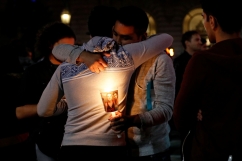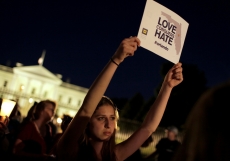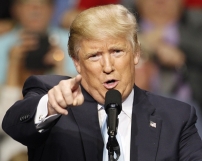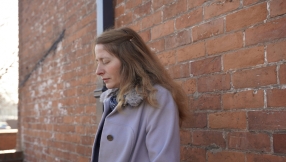Donald Trump on Monday accused Muslim refugees wanting to enter the United States of "trying to take over our children and convince them how wonderful ISIS is", as he blamed the mass shooting in Orlando on Sunday on radical Islam.
The presumptive Republican presidential nominee proposed a suspension of immigration into the US from regions of the world where there is "a proven history of terrorism", reiterating his vow to ban Muslims immigrants.
In his national security speech, Trump said it was time to "tell the truth about radical Islam" the day after 49 people were killed and more than 50 wounded at a gay nightclub in Orlando by a gunman, probably self-radicalised, who had sworn allegiance to Islamic State.
His comments contrasted sharply to those of Hillary Clinton, his probable Democratic rival in the November 8 election, who urged increased intelligence gathering and more airstrikes on Islamic State territory, and cautioned against "demonising" American Muslims.
Trump's rhetoric also differed significantly from that of President Barack Obama, who said America stood united in the face of "an act of terror and an act of hate" and would not give in to fear.
"In the face of hate and violence we will love one another," Obama said. "We will stand united as Americans to protect our people, defend out nation and take action against those who threaten us. We must not give into fear."
"If we want to protect the quality of life for all Americans – women and children, gay and straight, Jews and Christians and all people – then we need to tell the truth about radical Islam and we need to do it now," Trump told the crowd in New Hampshire.
He went on to lambast Clinton's policies, saying they would allow "hundreds of thousands of refugees from the Middle East" to enter the United States without adequate security measures.
There would be "no system to vet them, or to prevent the radicalisation of...their children," he said. "Not only their children, by the way. They're trying to take over our children and convince them how wonderful ISIS is and how wonderful Islam is, and we don't know what's happening."
Trump said that, if elected, he would use the executive authority of the presidency to impose stronger controls on immigration to protect Americans from attacks, fine-tuning his earlier campaign promise to temporarily ban the entry of foreign Muslims to shore up national security.
"When I'm elected, I will suspend immigration from areas of the world where there is a proven history of terrorism against the United States, Europe or our allies until we fully understand how to end these threats," he said.
He noted that the parents of the Florida gunman, Omar Mateen, 29, were born in Afghanistan. Pointing to specific incidents such as the 9/11 attacks, Trump said threats were posed by people with roots in Pakistan, Saudi Arabia and Somalia.
The immigration ban, he said would last until "we are in a position to properly screen these people coming into our country. They're pouring in, and we don't know what we're doing."
Trump has espoused a hard line on immigration throughout his campaign for presidency. He has pledged to build a wall to slow down the number of Mexicans entering the US, and in July last year claimed that Mexican immigrants were responsible for a significant number of rapes in America. His call for a ban on all Muslim immigrants was used by Somali terrorist group al-Shabaab to suggest that America discriminated against its Islamic population.
These hard-line proposals have helped fuel Trump's surge in popularity among some conservative voters; notably, a large swathe of his support is found among the Bible Belt – a haven for white evangelical Christians. But his policies have also triggered heavy condemnation from minority and human rights activists and his political opponents, many of whom have called his rhetoric racist.
Trump has rejected the criticism, and has said he is often misunderstood by the media and his opponents.
'Anti-woman, anti-gay'
In her response to the Florida massacre, Clinton called for increased efforts to remove Islamic State propaganda from the internet, more air strikes in areas held by the group and better coordination with allies in the region.
"The Orlando terrorist may be dead, but the virus that poisoned his mind remains very strong, and we must attack it," she said in a speech in Cleveland.
She specifically criticised three US allies – Saudi Arabia, Qatar and Kuwait – for allowing their citizens to fund mosques and schools that train jihadists.
She also proposed stricter gun control laws, reiterating previous calls to prohibit people on terrorism watch lists from buying firearms. She pointed out that while the Federal Bureau of Investigation was aware of Mateen as a possible threat, he was still able to purchase a gun legally.
"It's important that we stop the terrorists from getting the tools they need to carry out the attacks, and that is especially true when it comes to assault weapons like those used in Orlando and San Bernardino," California, Clinton said, drawing a standing ovation from the crowd.
Trump challenged Clinton to explain why she favoured letting Syrian civil war refugees into the US. He said his policies would better protect American women, gays and lesbians, Jews and Christians. Trump's support among women and gay voters lags far behind that of Clinton.
"Radical Islam is anti-woman, anti-gay and anti-American," said Trump. He accused Clinton of having ties to Saudi Arabia.
"Saudi Arabia and many of the countries that gave vast amounts of money to the Clinton Foundation want women as slaves and to kill gays," he said in a Facebook post. "Hillary must return all money from such countries!"
Additional reporting by Reuters

















